Archive Books
Archive Books
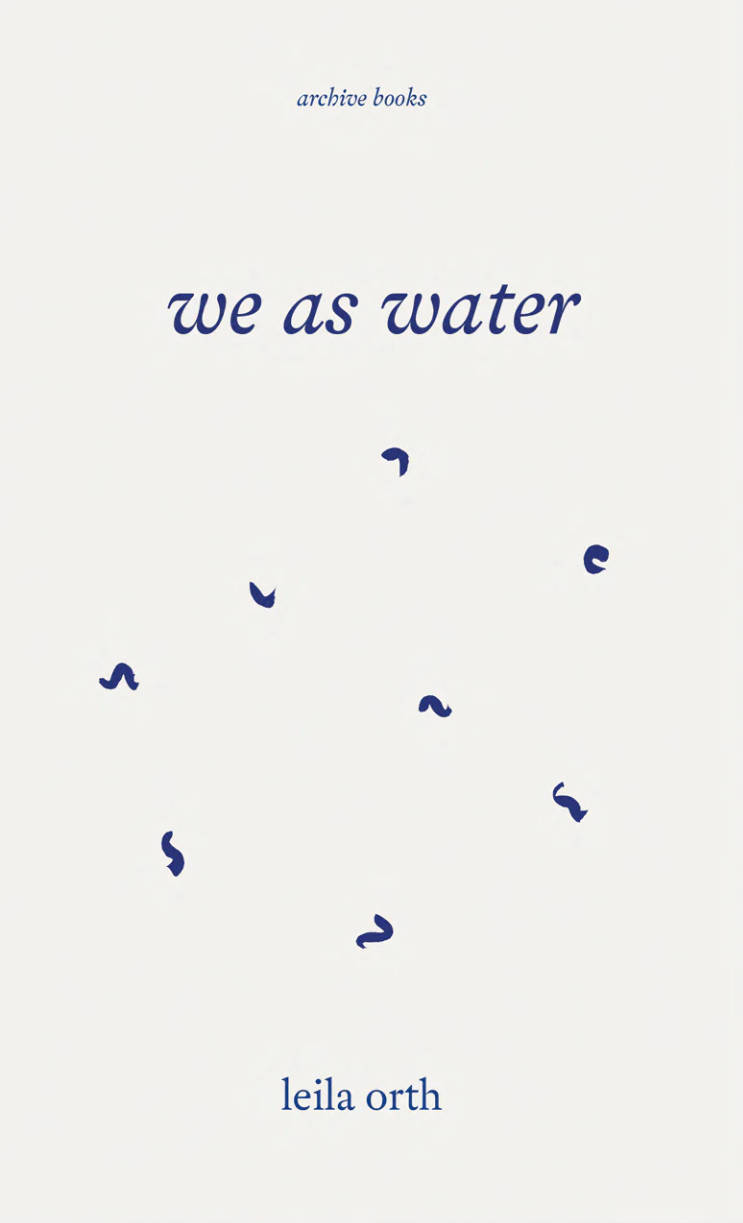
we as water
“Water has the power to connect us, reflects the relationship between past and present and provides space for narratives that have previously been overlooked."
In her book we as water, Leila Orth explores water as a site of memory, weaving together the stories of eight people who tell of oceans, rivers, and lakes and their own memories. Building on her many years of artistic engagement with memorials, Leila Orth uses the book to search for places, far removed from national memorials, that lead to a possible transnational form of remembrance. Water becomes a transnational site of memory, where layered stories and perspectives intertwine. It holds the traces of travellers and the drowned, the sand at the bottom of the seas, the history of the islands and coastlines where we grew up. It recalls our families, our longings, the past, the fighters, the dead, and the living.
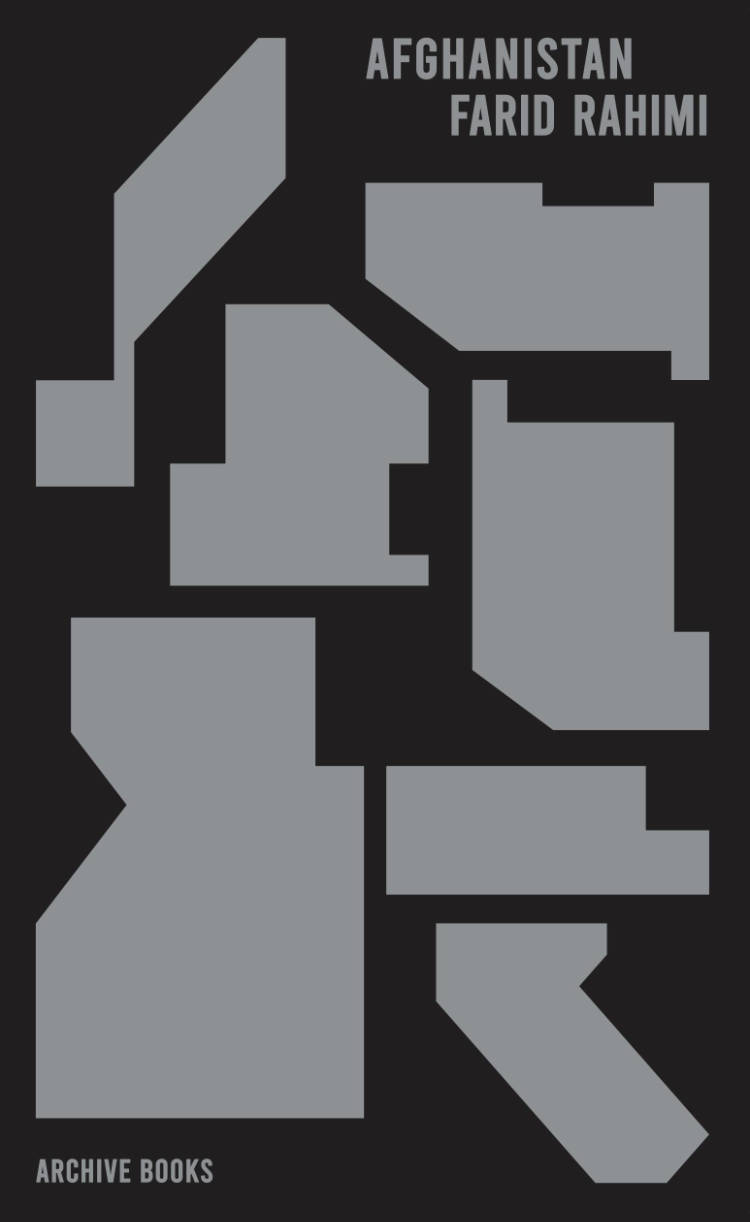
Afghanistan
Afghanistan is my father’s homeland. He was born in Kabul in 1945 and later moved first to France, then to Switzerland in the 1970s. In my mind, Afghanistan exists as a geography with blurred edges, something I feel the need to reconcile with. It’s a place I’ve only ever known through stories, a source of memories that, over time, have shifted and become distorted.
Contributors: Luca Cerizza, Farid Rahimi, Said Rahimi, Susanna Ravelli, Francesca Recchia, Zafar Sayan, and Dawood Tawana
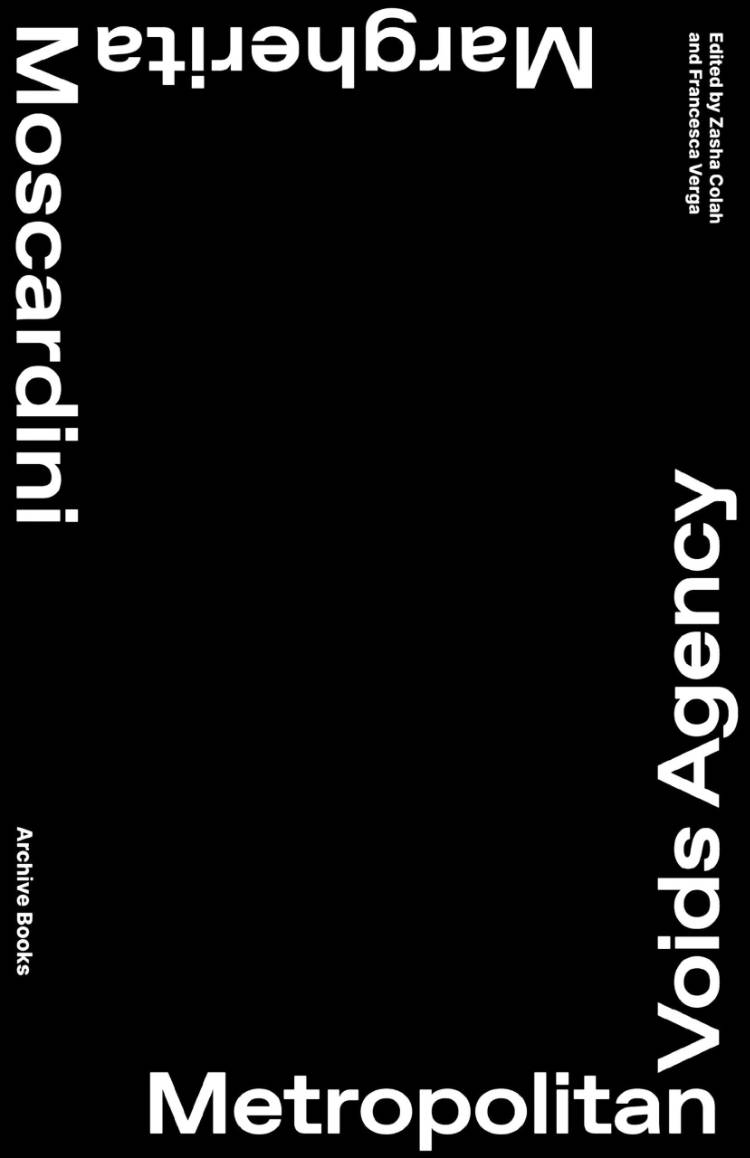
Metropolitan Voids Agency
Metropolitan Voids Agency is the first monographic publication dedicated to the collected works of artist Margherita Moscardini. The book recounts the work carried out by Moscardini spanning seventeen years, between 2008 and 2024, inviting a reading of her practice in its entirety as an investigation into ‘urban voids’: those which Moscardini has recognized and designated as voids, or those she has herself invented in the urban fabric.

Studies on Squats
Studies on Squats is an evocative exploration of embodied resistance and political movement that uses the multifaceted posture of the “Asian Squat” as a lens through which broader concepts of migration, illness, and resilience are examined. In Studies on Squats, the body—in its most vulnerable and potent states—becomes a speculative site for reclaiming agency by crafting new forms of protest that draw from ancestral strength, humor and eroticism. This posture, rich with cultural resonance, offers as an entry point to imagine ways in which the body can engage in acts of defiance against systems of oppression. Studies on Squats invites the audience to consider how dance and choreographic thinking can serve as tools for envisioning alternative futures, where artistry empowers those enduring systemic social injustices to transform their realities.

My Mother My Home
Who claims abstraction? What are the limits of abstraction? Are statelessness, dislocation and feelings of (un) belonging embodiments of an abstracted self that is in itself a work in progress? How could performance art—an artistic practice that places significant importance on presence and legibility of form—transgress into the realm of the abstract and the illegible in an effort to protect the artist’s likeness while shedding light on what it means to be in their body in relation to this world?
Chipo Chipaziwa’s My Mother My Home establishes itself as a query on the aspects of belonging and the artist’s own personhood that acts as the foundation of her practice. The question of where one’s personhood begins and ends within an artwork has appeared to be ever prevalent within the realm of visual art and is more relevant within the canon of performance art.
Writers: Chipo Chipaziwa, Denise Ferreira da Silva, Olumoroti George
Contributing artists: Margaret Joba-Woodruff, Sophia Lapres, and David Ezra Wang
Edited by Katrina Geotjen

Forgive Us Our Trespasses
The Forgive Us Our Trespasses Reader explores radical and emancipatory significations and fabulations of trespassing, turning towards practices that transgress and reshape the boundaries of, among other dimensions, currency, governance, religion, spirituality, language, and artificial intelligence.
Complementing the thematic concerns of the exhibition of the same name, this collection of essays, poems, artistic contributions, and a sermon, conceptually maps the distance between the English word "trespasses"—with its double meaning of to sin or to physically tread—and the German word "Schuld"—referring to sin and guilt but with etymological proximities to debt (Schulden). Deviating from the line of prayer that lends the project its name, the contributors do not ask for forgiveness for the various trespasses they elucidate—be they religious, social, class-related, national, sexual, or disciplinary in nature—but rather assert them as modes of transgression, as forms of rebellion, and as possibilities for transcendence.
Published on the occasion of the eponymous exhibition at Haus der Kulturen der Welt, Berlin, in 2024.
Contributions by Victoria Adukwei Bulley, Egidija Čiricaitė, Yásnaya Elena Aguilar Gil, Toussaint M. Kafarhire, Mansour Ciss Kanakassy, Chao Tayiana Maina, Bonaventure Soh Bejeng Ndikung, Tavia Nyong’o, Mary Louise Pratt, Josefine Rauch, Deborah A. Thomas, Senthuran Varatharajah, Yuanwen Zhong.
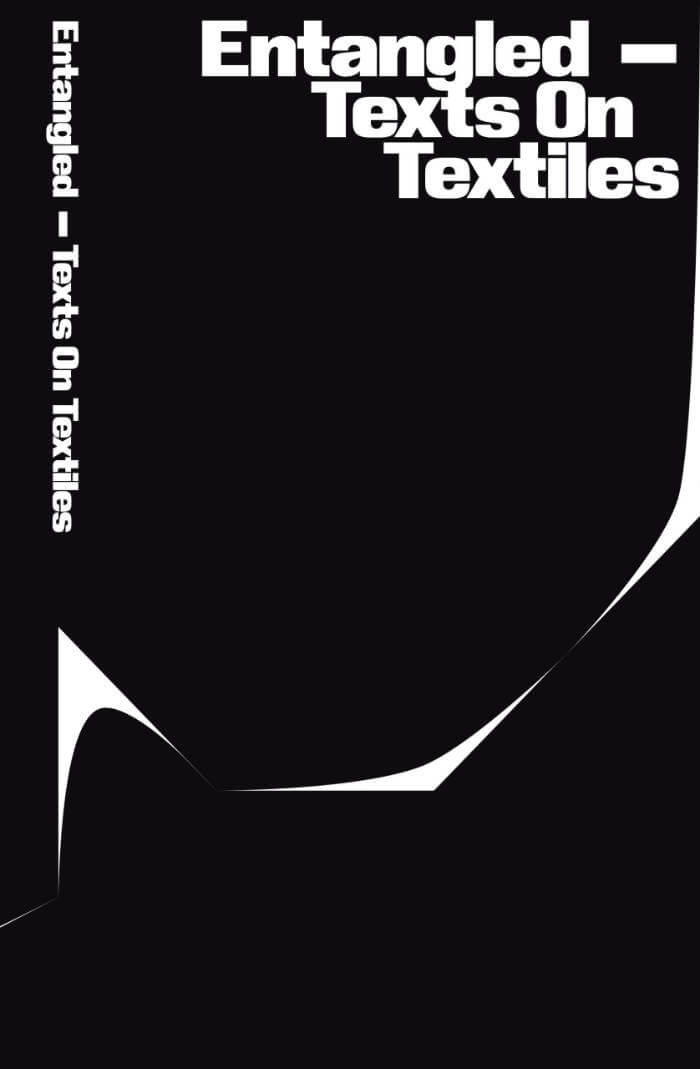
Entangled – Texts On Textiles
What does it mean to be a curator who writes, and, more specifically, how can curators write about textiles? This publication steps outside the framework of the typical exhibition catalogue to occupy "the space between literature and criticism".
The Community of writers was set up to create time and space to retreat from these outside opinions and demands and to let curiosity and the joy of writing be the driving forces of the writing process. This book has been realised under the auspice of Interweaving Structures: Fabric as Material, Method, and Message, and specifically through collaboration between the Faculty of Fine Art, Music and Design at the University of Bergen and the Central Museum of Textiles in Łódź. The two partners have strong positions of specialisation—the museum acts as a caretaker of material textile traditions and art in Poland, and the faculty has a strong textile art tradition and offers the only education programme for curators in Norway.
Edited by Anne Szefer Karlsen.
Contributions by Andreas Hoffmann, Heather Jones, Martina Petrelli, Anne Szefer Karlsen, Lea Vene, Johanna Zanon.
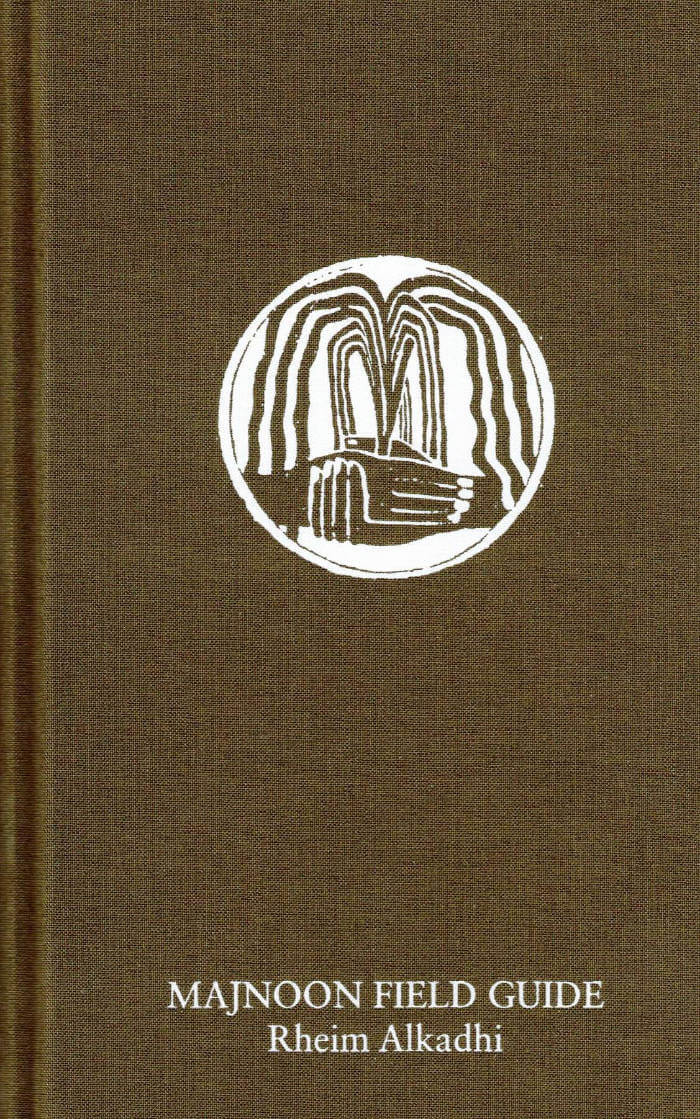
Majnoon Field Guide
I went to the field; I became many.
Majnoon is an oil field in the global south. Majnoon is also the violence, and the state of mind that survives the violence. How can this be a field guide in any customary sense? Latitudes have been taken. Words are written in disrupted or troubled syntax. Rather, this book proceeds alongside a search for what many call emancipatory practice; to been acted in the field, where we feel most alive. The volume is divided into five parts, preceded by maps and legends. First in the sequence is a colour-coded soil map,“Majnoon and Hir Environs”, adapted from material originally published in 1960 by the Iraqi Ministry of Agriculture. It was the product—relic, really—of a brief era that saw fields and farmlands redistributed among labourers and peasants. Since then, the map has changed with the shifting substance of our earthly constitution; it pivots on the example of Majnoon. Any map is appended by its legends, and I rewrite them from the perspective of dismantling. A longish colour key unfolds with the likeness of a poem pursuing return, inspite of scorch and ruin. It should be mentioned that ‘hir’ recurs multiple times throughout the book as gender-nonconforming pronoun—suggestive, ambiguous, and, in my opinion, sufficiently sound for the moment. It is essential to keep needling the problem of language.
A second, simpler map charts water flow as casualty of upstream accumulation. Dams are borders, after all, and we are lousy with them; downstream is sentenced to the whims of an architecture whose gates are mostly closed. On the map, a symbol resembling a small, numbered page locates Majnoon as point of interest. A subsequent diagram also contains this motif—not for navigation through the field, butt hrough the book itself.

But how does it change the price of tomatoes in the market?
In 2021, seven Fellows of the postgraduate program of the Berlin University of the Arts (UdK) gathered in despair over the institution’s failings. This publication explores what happens next. It emerges from an experimental process of dialogue and documentation, and tackles questions regarding globalized art production and the dissemination of knowledge. A dense collage of both critique and transformative artistic practices, the book is a unique contribution to the debate on socially engaged art. Just as importantly, it provides a point of reference for artists in comparable situations: those who pursue their work in the face of deadlocked institutions which uphold the status quo despite claiming to do the opposite. It strives to be a helpful pointer for artists who insist nonetheless on their ethical and political prerogatives. Vulnerability and conflict will accompany any such process, inevitably, and our publication does not dissimulate any of these things—even as it charts possible paths beyond them.
With: Adnan Softić, Amelie Jakubek, Ami Lien, Enzo Camacho, Nina Softić, Okhiogbe Omonblanks Omonhinmin, Shehzil Malik and Sonia Hamad

Film Undone – Elements of a Latent Cinema
Film Undone presents contributions introducing unmade and unfinished film projects, film ideas realised in non-filmic media, as well as films that remained unseen in their intended form and at their intended time.
These tentative and careful probes dedicated to singular projects reflect the importance of primary materials before and beyond the film. Bringing them together as Elements of a Latent Cinema opens a space to consider cases from various political geographies and historical moments in relation. Latency prompts to think differently about what has remained invisible in cinema than under deficit-centred categories such as failure, loss, or incompletion. It marks a sustained potentiality for things to change their condition, to affect us and set us in motion.
Contributions by Alejandro Alvarado, Carmen Amengual, Annabelle Aventurin, Alia Ayman, Concha Barquero, Petra Belc, Uliana Bychenkova, George Clark, Greg de Cuir Jr, Shai Heredia, Tobias Hering, Tom Holert, Katie Kirkland, Olexii Kuchanskyi, Brigitta Kuster, Dhianita Kusuma Pertiwi, Léa Morin, Tara Najd Ahmadi, Ojoboca, Uriel Orlow, Volker Pantenburg, Lisabona Rahman, Mathilde Rouxel, Bunga Siagian, Oleksandr Teliuk, Elena Vogman, Akbar Yumni

Two years Vacation
This book, Deux Ans de Vacances, Dos Años de Vacaciones, Dwa Lata Wakacji, Two years Vacation, Due Anni di Vacanza, documents the production of Céline Condorelli's process-based, cumulative artwork titled 'Tools for Imagination'. The title of the book raises the question of labour and working time, starting from a non-equivalence with its inverse: free time. We can read the various iterations of the title which appear on the cover as an expression of the impossibility of thinking about time outside of work in a univocal dimension.

Fraitaxtsēs sores tsîn ge ra≠gâ – Ondjembo yo Null Vier
A complete documentation on a multimedia exhibition by Berlin-based artist Ixmucané Aguila, giving voice to voiceless descendants of victims of genocide in Namibia.
Genocide in Namibia is an especially sensitive matter—its history has at times been ignored, underestimated, or even denied outright. In the artistic documentary Fraitaxtsēs sores tsîn ge ra≠gâ – Ondjembo yo Null Vier, Ixmucané Aguilar has worked in close collaboration with Nama and OvaHerero people who vividly evoke memories and rituals of mourning caused by human loss and land dispossession under Imperial Germany's violent occupation.
From these personal encounters emerge portraits, visuals and narratives as documental fragments, consisting of living voices which insist on defending memory as an invocation to witness and never to remain passive in the face of social injustice. Rather than a linear collection of data referring to distant places and its distant past, this work engages with stories as chronicles calling to be recognised as pieces of humanity and time.
Alongside Aguilar's portraits, this publication also contains contributions by human rights attorney Wolfgang Kaleck and the curator of the work Tristan Pranyko, along with poetry by Namibian artists Nesindano Namises, Fritz Isak Dirkse and Prince Kamaazegi, and narratives, testimonies, chants and mourning rituals shared by OvaHerero and Nama people in present-day Namiba.
Published on the occasion of the eponymous exhibition at National Art Gallery of Namibia, Windhoek, in 2023
Ixmucané Aguilar (born 1983) is a Guatemalan Berlin-based visual artist/designer who, through multi-layered documentary photography, engages in extensive field research to put out installations and art publications to relay her work in an artistic language.

On Trials – A manual for the theatre of law
An exploration of the performativity of the law within Egypt's spectral legal reality.
The publication dissects material collected for Jasmina Metwaly and Philip Rizk's film On Trials, a work-in-progress that uses modes of documentary and fiction making. In it, they reflect on sites where legal proceedings take place. And listen to all manner of actors from within the realm of the law including, lawyers, a TV camera operator who frequents courtrooms, a former inmate, on whose body the legal specter has left unutterable marks, and tailors who specialize in uniforms.
Born to an Egyptian father and a Polish mother, Jasmina Metwaly is a Cairo-based artist and filmmaker, and member of the Mosireen collective. She likes to work with people and their histories, texts, archives, images, scripts and drawings. She is interested in how stories create stories, and how they leave the space of one reality and enter another, intertwining the boundaries of both. Rooted in performance and theatre, her works focus on process-based practices that have a social function that generates tension between participants and audiences.
Filmmaker, writer and freelance journalist Philip Rizk was born in Germany, raised in Egypt and is based in Cairo. His practice has moved beyond the documentary mode that directly engages with realities of historical moments, allowing the documented image to be infiltrated by imaginary worlds. Rizk is part of the video collective Mosireen.

Archives on Show – Revoicing, Shapeshifting, Displacing – A Curatorial Glossary
Archives on Show brings the potential of reformulating the social and political relevance of archives by curatorial means into focus.
Based on the specific properties, faculties and methods of curation, the volume highlights those techniques and strategies that deal with archives not only to make their genesis and history apparent but also to open them up for the future. The 22 different ways of dealing with archives testify to the curatorial participation in (re)shaping the archival logic, structures and conditions. As process-oriented, collective and relational modes of producing meaning, these curatorial practices allow for the alteration, reconfiguration and mobilization of the laws, norms and narratives that the archive preserves as preconditions of its power.
The contributions to this volume by artists, curators and theorists demonstrate approaches that curatorially insist on building other relations between human and non-human archival participants. Each is using the book to create a curatorial constellation that generates and forms new connections between different times and spaces, narratives, disciplines and discourses. Configured as a glossary, the positions assembled in this volume exemplify curatorial methods with which to treat the archive as site and tool of collective, ongoing negotiations over its potential societal role and function.
Contributions by Heba Y. Amin, Talal Afifi, Eiman Hussein, Tamer El Said, Stefanie Schulte, Strathaus, Haytham El Wardany, Julie Ault, Kader Attia, Roger M. Buergel, Sophia Prinz, Yael Bartana, Rosi Braidotti, Kirsten Cooke, Ann Harezlak, Alice Creischer, Andreas Siekmann, Octavian Esanu, Megan Hoetger, Carlos Kong, Iman Issa, Kayfa ta, Kapwani Kiwanga, Doreen Mende, Stefan Nowotny, Marion von Osten, pad.ma, Abdias Nascimento, Eran Schaerf, Magdalena Tyżlik-Carver, Françoise Vergès.

I Will Draw a Map of What You Never See – Endeavours in Rhythmanalysis
Bonaventure Soh Bejeng Ndikung, Saskia Köbschall and 2 more
A multidisciplinary investigation of the interrelations of space and time, memory, architecture and urban planning through and beyond Henri Lefebvre's concept of Rhythmanalysis.
“The whole universe revolves around rhythm, and when we get out of rhythm, that's when we get into trouble.”—Babatunde Olatunji
A gathering of the echoes, memories and findings after three years of research, performances, exhibitions and conversations within “That, Around Which The Universe Revolves. On Rhythmanalysis of Memory, Times, Bodies in Space”. With chapters in Lagos, Düsseldorf, Harare, Hamburg and Berlin, the S A V V Y Contemporary project and publication bring together visual artists, urbanists, writers, photographers, performers, poets, and theorists to investigate the interrelations of space and time, memory, architecture and urban planning through and beyond Henri Lefebvre's concept of Rhythmanalysis.
Published following the exhibition project “That, Around Which The Universe Revolves. On Rhythmanalysis of Memory, Times, Bodies in Space”, SAVVY Contemporary, Berlin, from December 1st, 2017, to January 28, 2018.
Edited by Elena Agudio, Anna Jäger, Saskia Köbschall, Bonaventure Soh Bejeng Ndikung.
Contributions by Akinbode Akinbiyi, Jacques Coursil, Thulile Gamezde, Gintersdorfer/Klaßen, Noa Ha, Hebbel am Ufer Berlin (Annemie Vanackere & Ricardo Carmona), Kampnagel Hamburg (Caroline Spellenberg), Jan Lemitz, Dorothee Munyaneza, Lucia Nhamo, Christian Nyampeta, Qudus Onikeku, Tracey Rose, Louis Henri Seukwa, AbdouMaliq Simone, Awilda Sterling, Greg Tate, Kathrin Tiedemann, Trinh T. Minh-ha, Tinofireyi Zhou, Percy Zvomuya.

The Illusion of a Crowd
Publication including the films Transformation Scenario, 70.001, and Faux Terrain, as well as a visual essay, a glossary and texts by Heike Geißler, Fanni Fetzer, and Franciska Zólyom.
“When I visited the Elias Canetti archive at the Zentralbibliothek Zurich, I was looking for manuscripts and sketches for his major work Crowds and Power (1960). I imagined that Canetti must have made drawings, as the behaviour of the various crowd types he identified was described in such detail. I hoped that these drawings would help me transfer the group behaviour he describes to virtual figures in an animated film.
The archive of manuscripts, arranged by Elias Canetti himself, was handed over to the Zurich library and contains the notes and sketches he completed during the development of Crowds and Power, a period of almost forty years. However, in this context I found no drawings—Canetti had only made graphic lists on various themes. So where did Canetti's precise descriptions of the scenes come from?”
Clemens von Wedemeyer (born 1974 in Göttingen, lives and works in Berlin) creates films, videos and media installations poised between reality and fiction, reflecting power structures in social relations, history and architecture.
Edited by Fanni Fetzer and Franciska Zólyom.
Texts by Heike Geißler, Fanni Fetzer, Franciska Zólyom.

Not Working
Not Working brings together the contributions by artists, theorists and writers who in their work examine the interdependence of artistic production and social class.
The complex structures and substantial rise in social inequalities, particularly visible in light of the current pandemic, have given the concept of class a wide range of connotations. Despite the ongoing attempts to view contemporary art in the sense of "class homogeneity"; it remains complicit in the reproduction and masking of existing conditions which it often claims to overcome. The texts in this book form a ground were class can be mediated with respect to artistic practices and other structures in the art world.
Published on the occasion of the exhibition Not Working, Artistic production and matters of class at Kunstverein München in 2020.
Contributions by Maurin Dietrich, Melanie Gilligan & Marina Vishmidt, Annette Wehrmann, Stephan Janitzky & Laura Ziegler, Lise Soskolne, Josef Kramhöller, Leander Scholz, Dung Tien Thi Phuong, Steven Warwick, Mahan Moalemi.

Shaping Revolutionary Memory – The Production of Monuments in Socialist Yugoslavia
Sanja Horvatinčić, Beti Žerovc
A comprehensive overview of the vast production of monuments in socialist Yugoslavia (1945–91) dedicated to the antifascist People's Liberation Struggle in the Second World War and the socialist revolution.
Since the breakup of Yugoslavia in the 1990s, these monuments have been subject to various fates, from neglect and physical destruction to global fame generated by the high-modernist visual appeal of a number of them. But the full scope, wide-ranging diversity, and complex context of Yugoslav monument making, including its various contradictions, have remained largely unexplored.
The book offers a thorough and interdisciplinary exploration of this phenomenon and a rich visual material to examine its key characteristics and specificities: What memorial practices and commemorative traditions preceded the development of monument-making in socialism? Who commissioned these monuments and how did Yugoslav cultural and memory politics influence their production? Who were their authors and what defined their formal and typological features? How was Yugoslav monument production related to comparative efforts abroad? What commemorative practices developed around monuments? How is this legacy evaluated and received today, both in the post-Yugoslav successor states and internationally?
Contributions by Marija Đorđević, Sanja Horvatinčić, Heike Karge, Ljiljana Kolešnik, Vladimir Kulić, Bojana Pejić, Sabina Tanović, Beti Žerovc.
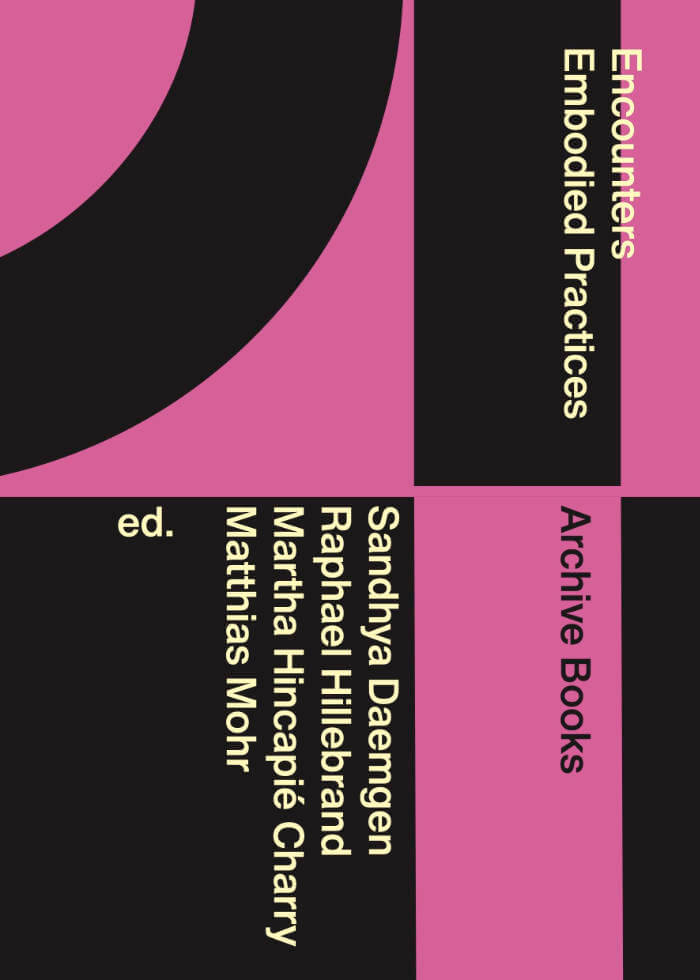
Encounters – Embodied Practices
Sandhya Daemgen, Raphael Hillebrandt and 2 more
Conversations about embodied strategies of knowledge production and knowledge transmission based on the choreographic and curatorial practices of about fifteen international choreographers, performers, dramaturges and curators.
In the context of the numerous ethical-political challenges of the global present, actors from the dance and choreography scene both in Berlin and internationally talk about forms of knowledge production beyond the prevailing conception found in Western modernity. They counter the mind-body separation and the notion of a universality of knowledge with multiplicities of knowledge production that emerge with and from the reality of differently situated bodies.
What potential do embodied practices offer for emancipatory movements? How can community be created through these practices, and what responsibilities does this entail? What role does the body play in the preservation and transmission of knowledge?
In this publication, edited by the choreographers and curators Martha Hincapié Charry, Sandhya Daemgen, Raphael Moussa Hillebrand and Matthias Mohr; Lukas Avendaño, Wagner Carvalho, Sandhya Daemgen, Ismail Fayed, Alex Hennig, Raphael Moussa Hillebrand, Martha Hincapié Charry, Isabel Lewis, Matthias Mohr, Prince Ofori, Mother "Leo" Saint Laurent, Léna Szirmay-Kalos, Thiago Granato and July Weber conduct conversations about embodied strategies of knowledge production and knowledge transmission based on their respective choreographic and curatorial practices.
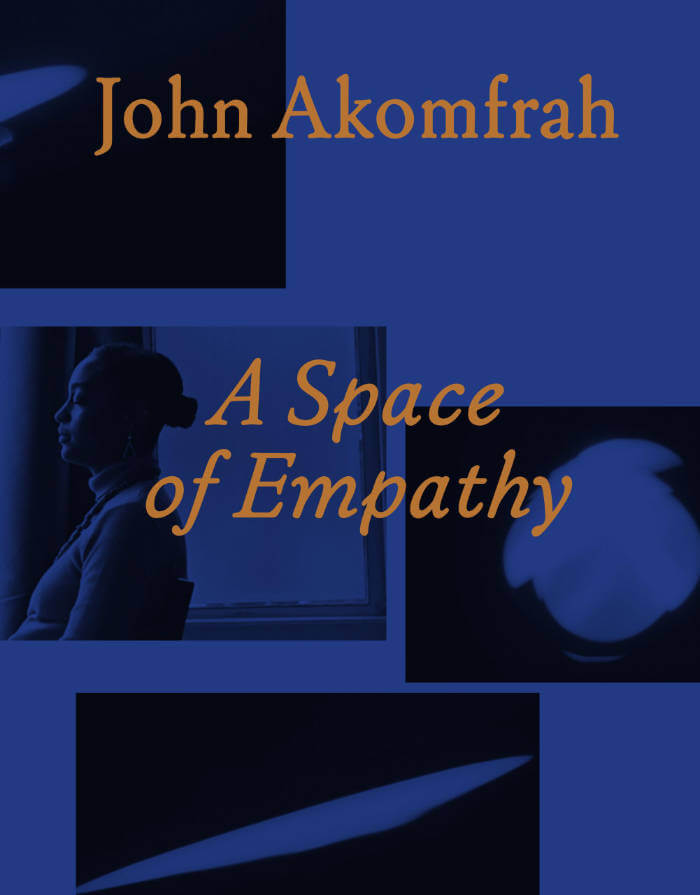
A Space of Empathy
An overview of John Akomfrah's work, with contributions by Julia Grosse and Nelly Y. Pinkrah, an interview with the artist, along with a foreword by Sebastian Baden.
John Akomfrah creates thoughtful video works of haunting audiovisual intensity. He tells of the radical changes and crises of the present and past on characteristic large-format screens. From November 9, 2023 to January 28, 2024, the Schirn Kunsthalle Frankfurt is presenting for the first time a comprehensive overview of the artist's work in Germany, featuring a selection of three major multichannel installations from recent years: The Unfinished Conversation (2012), Vertigo Sea (2015), and Akomfrah's new work, Becoming Wind (2023). A co-founder of the influential London-based Black Audio Film Collective (established in 1982), Akomfrah's work interweaves newly shot film sequences with archival material to create multilayered, at times associative collages, frequently in the form of simultaneous narrative structures.
Akomfrah's immersive installations critically examine colonial pasts, global migration, and the climate crisis. He addresses one-dimensional historical representations by allowing multiple perspectives to emerge in the narrative, disrupting the notion of linearity and the illusion of a one and only truth.
Published on the occasion of the eponymous exhibition at Schirn Kunsthalle Frankfurt in 2023-2024.
John Akomfrah (born 1957) is a British artist, writer, film director, screenwriter, theorist and curator. His works are characterised by their investigations into memory, post-colonialism, cultural identity, temporality and aesthetics and often explores the experiences of migrant diasporas globally. Akomfrah was a founding member of the influential Black Audio Film Collective, which started in London in 1982 alongside the artists David Lawson and Lina Gopaul, who he still collaborates with today.

Togetherward
A volume assembling new and existing documents that revisit, mix and remix moments in the work of artist Christian Nyampeta.
The volume is composed of affections, alliances, appearances, material, and memories that exceed singular authorship, in the form of dedications, documents, elegies, film stills, footnotes, photographs, poetry, presences, and translations. Together they draw a biography of research: the journeys of engaging with art learning and making in, with, and against the worlds of today.
This stream of existing documents is sequenced alongside new contributions by Omar Berrada, Binna Choi, Belinda Kazeem-Kaminski, Natacha Nsabimana, and Isaïe Nzeyimana.
The publication emerges from a close collaboration with GfZK (Galerie für Zeitgenössische Kunst, Leipzig) over the last three years. During this time, two projects were held at GfZK: A Flower Garden of All Kinds of Loveliness without Sorrow, 2018–2019, and Lovers in a Dangerous Spacetime, 2021.
Literature, history, theology and philosophy, as well as insights from experiences and encounters in practice between contemporary art and design percolated into the two exhibitions; public programs; and an ongoing scriptorium, in which the artistic works staged gatherings of artists, theorists and mythologists from Rwanda and further afield who would otherwise never meet.
Titled Togetherward, a word invented by philosopher and artist Denise Ferreira da Silva to describe the rhythm of Nyampeta's method, the volume preludes a series of publications in images, writing, sound, film, and musical recordings that revisit the layers and sediments of the global events of the previous decade—all driven by the burning question of how to live together.
Edited by Vera Lauf and Christian Nyampeta.

Toward a Transindividual Self (2nd edition)
A book that examines the process of performing the self, distinctive for the formation of the self in Western neoliberal societies in the 21st century. It approaches the self from a transdisciplinary angle where political and cultural anthropology, performance studies and dramaturgy intersect.
Starting from their concern with the crisis of the social, which coincides with the rise of individualism, Vujanović and Cvejić critically untangle individualist modes of performing the self, such as possessive, aesthetic, and autopoietic individualisms. However, their critique does not make for an argument for collectivism as a socially more viable alternative to individualism. Instead, it confronts them with the more fundamental problem of ontogenesis: how is that which distinguishes me as an individual formed in the first place? This question marks a turning point in the study, where it steps back into the process of individuation, prior to, and in excess of, the individual.
The process of individuation, however, encompasses biological, social, and technological conditions of becoming whose real potential is transindividual, or more specifically, social transformation. A ‘theater of individuation’ (Gilbert Simondon) captures the dramaturgical stroke by which the authors investigate social relations (like solidarity and de-alienation) in which the self actualizes its transindividual dimension. This epistemic intervention into ontogenesis allows them to expand the horizon of transindividuation in an array of tangible social, aesthetic and political acts and practices. As with every horizon, the transindividual may not be closely at hand; however, it is certainly within reach, and the book encourages the reader to approach it.
"Towards a Transindividual Self is an ambitious and capacious effort to theorize a new way to approach collectivity for political purposes through the lens of performance. Convinced that the current neoliberal conjuncture has only heightened a form of capitalist individualism that blocks notions of the social, the authors aim to show that a "transindividual formation of the self can bring about different courses of action and a more socially driven imagination." Transindividuation, they assure us, shows how "we form ourselves on the basis of interdependence, sharing, commonality, as well as indispensability of the individual as the agent of creativity/ knowledge, freedom, and change, who 'possibilizes' their own conditions of formation."
— Professor Janelle Reinelt (University of Warwick), co-editor of Critical Theory and Performance (University of Michigan, 2006)
"Perhaps the most striking thing about this book is the manner in which it is able to engage with multiple discourses from political theory to aesthetics. In this way it both follows the ambitious scope of Simondon’s work on individuation, and expands into areas that Simondon did not cover, most notably politics and cultural politics, which is the book’s central concern. Rather than ask the question is the individual imagined or real, an effect of social relations or their distortion, the focus on the transindividual makes it possible to grasp individuation as a process: “Instead of pondering how the passage from one to many occurs, individuation permits us to immediately trace a bidimensional process in which both individual persons and the collectivities they form are altered. Another meaning of the crisis of the social has brought about a perfect slogan of such a process of transindividuation: ‘No one will be left alone in the crisis.” (…) Towards a Transindividual Self does a brilliant job of not only arguing for the importance and relevance for the transindividual as a concept for politics, performance, and the politics of performance, but of demonstrating a bold standard for political and aesthetic inquiry."
— Professor Jason Read (University of Maine), author of The Politics of Transindividuality (Brill, 2015)
Co-published by Oslo National Academy of the Arts, Sarma and Multimedijalni institut.

Maa Ka Maaya Ka Ca A Yere Kono – 13th Edition of the Rencontres de Bamako - African Biennale of Photography
Bonaventure Soh Bejeng Ndikung
The catalogue of the 13th edition of the Rencontres de Bamako - African Biennale of Photography, focusing on multiplicity, difference, becoming, and heritage.
The dominant narrative in this "globalized world" is, incidentally, that of singularity—of universalism, of single identities, of singular cultures, of insular political systems. With this narrative, however, comes an illusory sense of stability and stasis; identities seem inalterable, cultures are immutable, political systems prove uneasy in the face of change. Thus, in sustaining this pervasive discourse, there has been a great loss of multiplicity, of fragmentation, of process and change, and not least of complex notions of humanity and equally complex narratives.
In decentering this year's biennale On Multiplicity, Difference, Becoming, and Heritage, General Director Cheick Diallo, Artistic Director Bonaventure Soh Bejeng Ndikung, and the curatorial team—Akinbode Akinbiyi (artist and independent curator), Meriem Berrada (Artistic Director, MACAAL, Marrakech), Tandazani Dhlakama (Assistant Curator, Zeitz MOCAA, Cape Town, South Africa), and Liz Ikiriko (artist and Assistant Curator, Art Gallery of York University, Toronto)—of the Bamako Encounters pay a powerful tribute to the spaces in between, to that which defies definition, to phases of transition, to being this and that or neither and both, to becoming, and to difference and divergence in all their shades. Accordingly, Amadou Hampâté Bâ's statement (Aspects de la civilisation africaine, Éditions Présence Africaine, 1972) presiding over the manifestation, Maa ka Maaya ka ca a yere kono,translates to, "the persons of the person are multiple in the person."
A key tool for negotiating the processual and shifting nature of multiplicity lies in storytelling. It is the central medium through which humanity points the lens on itself and launches an attempt at self-understanding and reflection, and the breadth of answers given throughout history testifies to the congenial nature of storytelling and multiplicity. Moreover, the stories we tell not only negotiate who we are but also expose underlying currents of who we will become in the future. This is the concern lying at the heart of the 13th edition of the Bamako Encounters—the stories we tell, the multiple facets of humanity we accommodate, notions of processuality, becoming in being, embracing identities that are layered, fragmented, and divergent, and the multifarious ways of being in the world, whether enacted or imagined. It should be emphasized that this does not apply only to questions of personal identity. On the contrary, it is a bold affirmation of transformation and transition, of becoming in an emphatic sense, and is thus equally significant for state politics. It also rings true for questions of heritage/patrimony. Embracing the kaleidoscopic legacy of our multiple heritages means to open them up and liberate the term "patrimony" from its etymological roots (the Latin patrimonium means "the heritage of the father"), imagining in its place an inclusive concept of matrimony.
Thus, in this 13th edition of the Bamako Encounters with the title Maa ka Maaya ka ca a yere kono, artists, curators, scholars, activists, and people of all walks of life are invited to reflect collectively on these multiplicities of being and differences, on expanding beyond the notion of a single being, and on embracing compound, layered and fragmented identities as much as layered, complex, non-linear understandings of space(s) and time(s).
Published following the 13th edition of the Rencontres de Bamako - African Biennale of Photography, in Bamako, Mali, in 2022.
With Saïd Afifi, Ixmucané Aguilar, Baff Akoto, Annie-Marie Akussah, Américo Hunguana, Daoud Aoulad-Syad, Leo Asemota, Myriam Omar Awadi, Salih Basheer, Shiraz Bayjoo, Amina Benbouchta, Hakim Benchekroun, Maria Magdalena Campos Pons, Rehema Chachage, Ulier Costa-Santos, Adama Delphine Fawundu, Fatoumata Diabaté, Aicha Diallo, Amsatou Diallo, Anna Binta Diallo, Mélissa Oummou Diallo, Nene Aïssatou Diallo, Binta Diaw, Adji Dieye, Imane Djamil, Sènami Donoumassou, Abdessamad El Montassir, Fairouz El Tom, Luvuyo Equiano Nyawose, Raisa Galofre, Raisa Galofre, Joy Gregory, Gherdai Hassell, Thembinkosi Hlatshwayo, Letitia Huckaby, Anique Jordan, Gladys Kalechini, Hamedine Kane, Atiyyah Khan, Gulshan Khan, Seif Kousmate, Mohammed Laouli, Maya Louhichi, Mallory Lowe Mpoka, Nourhan Maayouf, Marie-Claire Messouma Manlanbien, Botembe Moseka Maïté, Louisa Marajo, Clarita Maria, Billie McTernan, Mónica de Miranda, Arsène Mpiana Monkwe, Sethembile Msezane, Ebti Nabag, Elijah Ndoumbe, Lucia Nhamo, Samuel Nja Kwa, Nyancho NwaNri, Jo Ractcliffe, Adee Roberson, Fethi Sahraoui, Muhammad Salah, Neville Starling, Eve Tagny, René Tavares, Sackitey Tesa, Helena Uambembe, David Uzochukwu, Sofia Yala, Timothy Yanick Hunter.
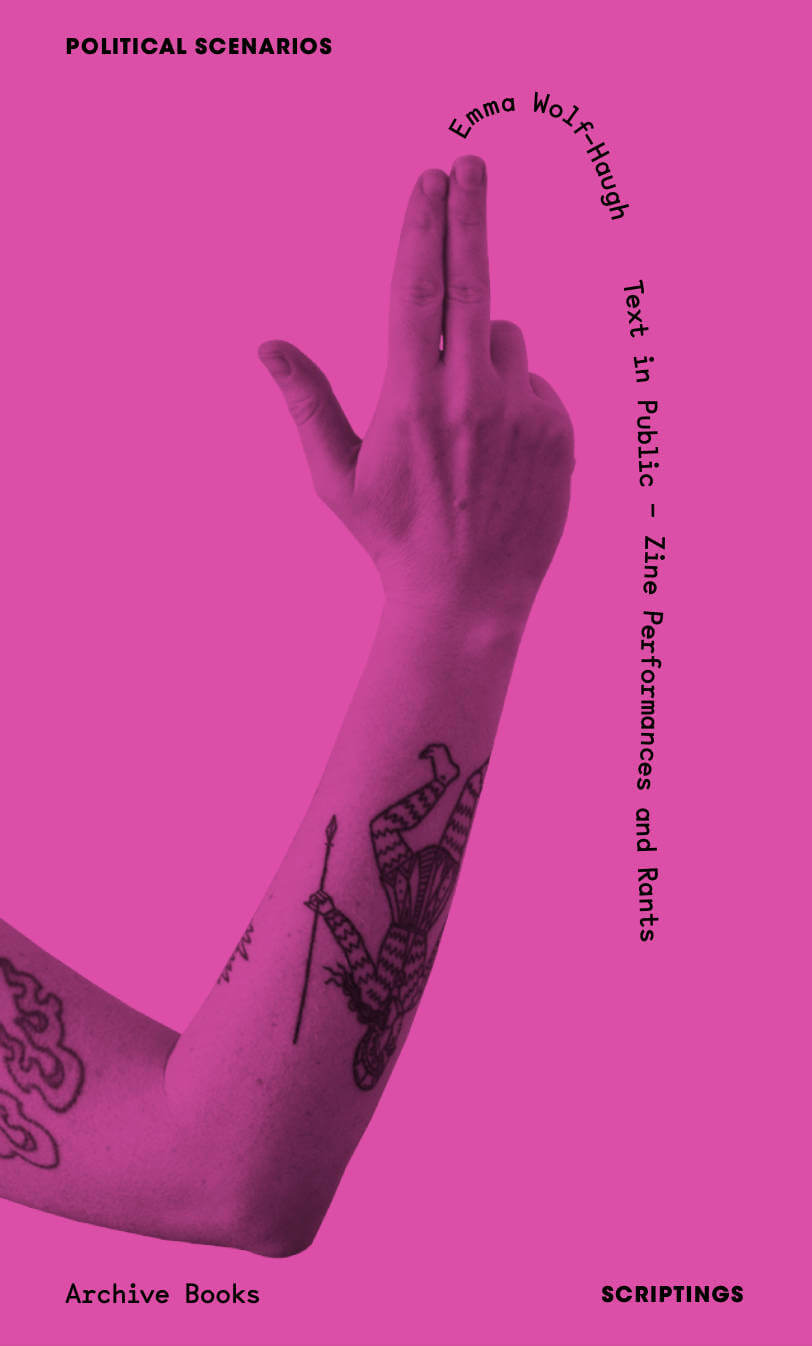
Text in Public – Zine Performances and Rants
The first monograph of writing by visual artist Emma Wolf-Haugh interconnecting performative works, performance scripts and assemblage texts.
Over the past decade Wolf-Haugh has developed an interdisciplinary practice, which incorporates and overlaps installation, performance, and experimental workshop formats, in which the practice of self- and collective DIY publishing often serves as a kind of porous container to re-combine and bundle their multifaceted activities with text.
The publication gathers together these texts, traversing particular cultural and historical sites, the lived present and imagined futures, incorporating auto-fiction and anecdote as part of a tradition of queer-transfeminist working class vernacular and ethics, promiscuous and adept at working within limitations.
Emma Wolf-Haugh (born 1974) is a visual artist, educator and writer based Berlin and Dublin and working internationally, whose work is shaped by economic necessity, engaging forms of recycling, thrift and ephemera that result in soft modularity, wild archiving, and performative intervention, posing questions about value, accumulation, and authorship. Emma Wolf-Haugh is co-founder of The Many Headed-Hydra (TMHH), aqueous-decolonising collective since 2015, and founder of The Reading Troupe - Disruptive Pedagogy, workshop and zine series since 2013.